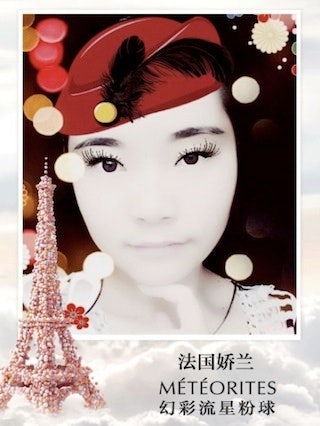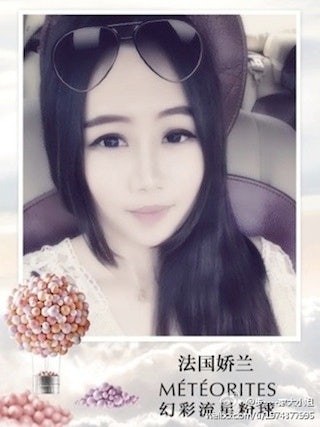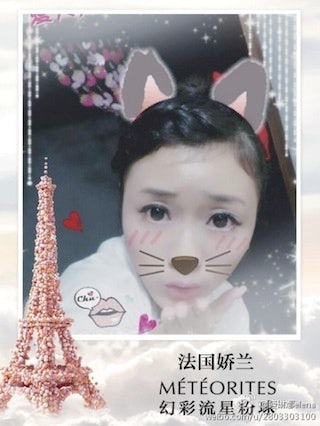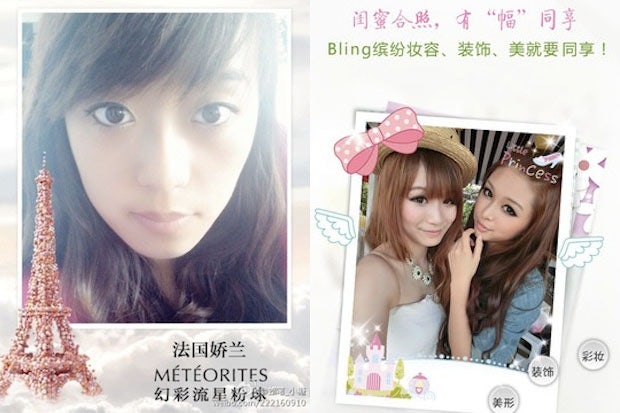
On the right is an ad for POCO's "beauty camera" app, while the left features a user who has selected Guerlain's sponsored border for its social media campaign. (POCO/Weibo)
If you don’t happen to be a young, tech-savvy Chinese woman with a penchant for heavily edited mobile self-portraits, taking a photo of yourself with POCO’s “Beauty Camera” (Meiren Xiangji 美人相机) smartphone app can be more than a bit disarming. After using the program to snap a self-portrait, a glimpse of your disappointing regular face, complete with poor lighting and blemished skin, is instantly transformed into a doll-like, luminous, porcelain masterpiece. The changes don’t stop there, however. After the app conducts its initial magic, you can add huge eyelashes and anime-like makeup, widen your pupils, plump your lips, and even reshape your chin. Once you are satisfied with your new, sometimes virtually unrecognizable fantasy cartoon image, you can promptly upload your brand new self to your Weibo or other social media account with the tap of a screen.
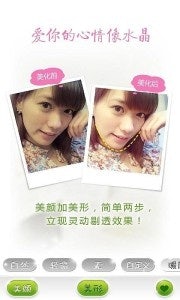
An ad for POCO's beauty app shows its chin-reshaping feature. (POCO)
Although those without cultural context may not completely understand the desire to alter one’s image to unnatural bug-eyed dimensions, POCO’s extensive range of appearance-“enhancing” options are insanely popular with young Chinese women from a broad range of ages, stretching all the way from teens to mid-30s. As a result, beauty brands have taken notice of the valuable promotional possibilities posed by this free downloadable piece of mobile software.
“You’re so youthful, but what is to be done about the pimples on your face?” asks the app's iTunes store entry.
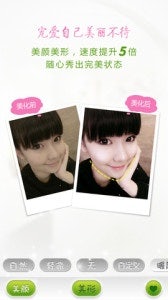
Before and after shots in an ad for POCO's beauty app. (POCO)
POCO certainly thinks it has a solution, providing Chinese women with the opportunity to actively pursue an idealized China-specific beauty aesthetic that has been ingrained into their psyche through countless films and advertisements. This app is one of the most extensive versions of a wave of “photo booth”-style apps popular among young Chinese women, which also include Mei Pai and Mei Tu Xiu Xiu. While technological advancements allow these apps to stretch, smooth, and sculpt like never before, the aesthetic draws from the pre-smartphone era of popular Asian sticker photo booths called da tou tie (literally meaning “big-head sticker”), which Chinese girls would pour their spare RMB into in order to rack up huge books of stickers featuring them staring wide-eyed into the camera for a heavily washed-out—i.e., pale and blemish free—photo. Although these booths have now been relegated to use mainly by middle-schoolers, their main service is alive and well in mobile form on the devices of the 20 to 30 year olds who grew up with them.
Beauty companies with product lines advertising skin changes similar to what these apps do—whitening, smoothing, and shimmering—have taken notice of the advertising opportunities present in this form of app.
Most recently, French cosmetics and perfume company Guerlain teamed up with POCO to market its Météorites powder on the app, a product which employs the “technology of white light” to “erase imperfections and soften features” much in the way that the app transforms its users’ skin onscreen. The use of this device is a savvy marketing move for Guerlain—by advertising on the app, women wishfully hoping for their fantasy images to reflect their real-life self are presented directly with a product promising to do this for them.
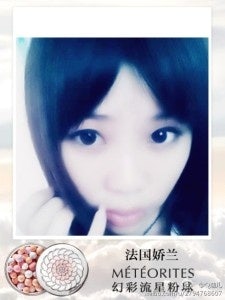
A typical submission to Guerlain's interactive campaign. (Weibo)
Guerlain’s highly stylized method for advertising on the app involved a social media component and giveaway option. Going a step beyond advertisers' typical strategy of embedding spammy, distracting ads that users are likely to exit out of, Guerlain created a special frame option that women could choose to upload with their picture. If they uploaded the picture to Weibo with a specific tag (#博个美丽星愿#), they were entered into a contest to become real-life models in a magazine photo shoot sponsored by the company, and one grand prize winner would be able to experience the brand’s French heritage with a free trip to Paris. The tag appeared in comments by around 41,400 users, many of whom clearly spent intense effort on crafting a worthy image.
The reasons behind these beauty standards present in the app's somewhat unsettlingly unnatural aesthetic—large, rounded eyes, pointed chins, and light, luminous skin—are constantly under analysis by cultural experts, who debate the extent to which admiration of these anime-like features comes from emulation of a more “Western” look or from other aspects of Chinese culture. It is common knowledge among beauty marketers that pale skin is thought to be more attractive than darker skin in China, which many believe is due to the fact that a lighter tone is highly associated with affluence. While U.S. consumers stock up on tanning products and hit the beach in the summer, Chinese women invest much more heavily in SPF and frequently carry parasols to shield their skin from the sun.
Guerlain, which markets its shimmering pearls to both Asian and European and North American consumer groups, emphasizes its “perfecting” properties to all groups, yet also has a skin whitening product like almost all other beauty companies in Asia.
Look below to see the efforts that some Guerlain fans went to when entering the contest:
